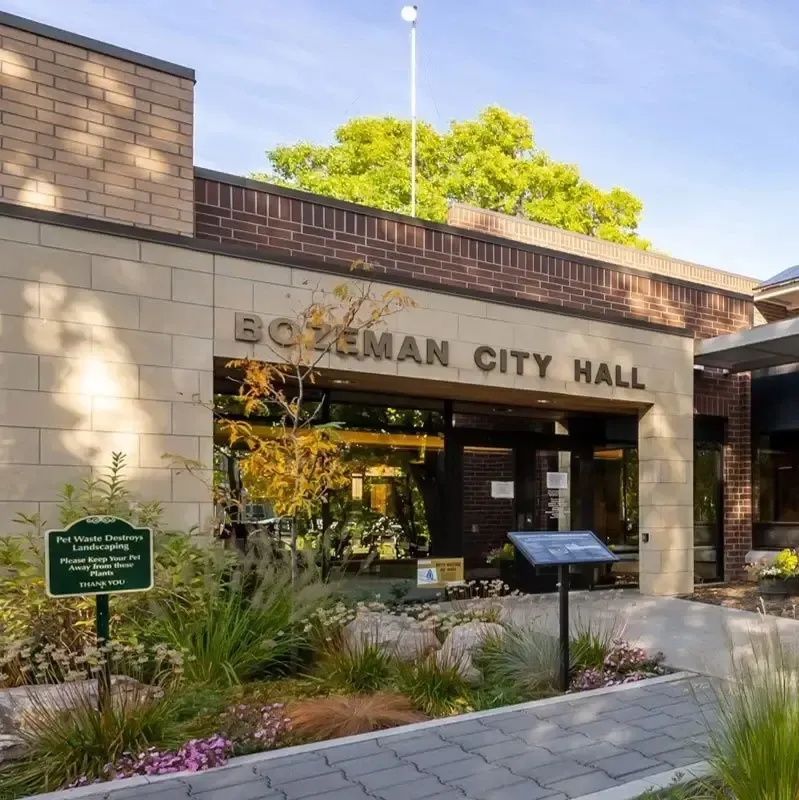
Over the past few weeks, we have worked to bring public awareness to an important issue taking place inside Bozeman City Hall. City Commissioner Emma Bode, along with activist groups including Queer Bozeman, Forward Montana, and the lesser-known Countship of the ISCSM (a non-profit known for its drag performances and LGBT advocacy), are pushing to have the “pride” flag adopted as an official city flag. This move is a strategic way to circumvent House Bill 819, a new state law that explicitly prohibits flags with political affiliations from being displayed on government property.
This issue galvanized public response at the July 8 City Commission meeting, where residents delivered nearly two hours of public comment, despite the item being removed from the agenda just days before. Now, the proposal to adopt the “pride” flag as an official city flag is back on the agenda for an official vote at the City Commission meeting on Tuesday, July 15, and we must keep pushing back. This fight is far from over. We must stand up for neutrality and resist the politicization of our city’s official symbols.
Commissioner Bode herself acknowledged the division, stating, “If you do choose to vote against raising the pride flag through any of these potential options that we have, I will respect your right to have that difference of opinion, but I do insist that you make that decision on the record and not as a result of avoiding the conversation entirely.” To “insist” is a bold demand from someone who was appointed, not elected. Her tone is less about dialogue and more about intimidation, an effort to publicly mark those who disagree as morally suspect. It’s a kind of performative pressure, as if voting no requires a scarlet letter.
At Tuesday’s meeting, Mayor Terry Cunningham misleadingly framed the discussion, saying that “Bozeman is deciding how to comply with the effect of HB 819,” as if the law were vague or confusing. In reality, compliance is straightforward: fly the U.S. flag, the State of Montana flag, and the City of Bozeman’s official municipal flag, first displayed in 1966. Anything else is a deliberate provocation, not a good-faith effort to navigate the law. HB 819 plainly bans flags tied to political or ideological viewpoints, including those connected to sexual orientation, from being flown on public property. The city is not “deciding how to comply;” it is actively flirting with defiance. Adoption of the “pride” flag as an official city flag would then allow it to be displayed on other public property, including the library and public schools.
The city staff memo released Thursday spells out the risks: “Adopting the Pride flag may draw increased attention to the City’s diversity, equity, and inclusion initiatives and related executive orders. This could invite legal challenges or public scrutiny, leading to unplanned legal costs, and additional staff time to respond. The increased attention could also lead to closer examination of other City initiatives, potentially complicating federal grant processes if concerns are raised about compliance with executive orders.”
In other words, adopting the “pride” flag as an official city flag is not a harmless gesture; it invites controversy, legal exposure, political division, and increased scrutiny of the city’s DEI initiatives. It risks triggering lawsuits, burdensome litigation, and even loss of federal funds due to potential violations of executive orders and state law. The consequences of this decision are real, and they will fall on taxpayers.
Worse yet, it takes up valuable staff and community time and displaces attention from issues that impact all residents. We’re told that there isn’t time in a regular City Commission meeting to have the important discussion on changes to zoning, a subject that impacts every household, so it was moved to a “special meeting” on a Monday afternoon. Meanwhile, this symbolic proposal gets prime-time placement. There isn’t staff time or capacity to complete a full review of the city’s Community Plan, but somehow there’s time for this. The urgency placed on this symbolic issue is unreasonable. It distracts the public from more pressing matters and diverts energy away from policy discussions that affect people’s daily lives.
Supporters of adopting the “pride” flag as an official city flag frame their arguments around themes of inclusivity, safety, and visibility, often leveraging emotional appeals to rally support.
But what happens when the city opens the door to symbolic favoritism? If Bozeman adopts the “pride” flag, what stops other groups – religious organizations, social organizations, or ethnic advocacy groups, from demanding the same status for their symbols because it would help them to feel more “included” and “seen?”
We’ve seen how this can play out. If Bozeman selectively allows some ideological or political flags, like the “pride” flag, to fly at City Hall, while denying others, it risks turning its flag policy into a public forum and may be exposed to lawsuits. As an example, under Shurtleff v. City of Boston (2022), the U.S. Supreme Court ruled that the City of Boston violated the First Amendment when it denied a request to fly a Christian flag on a city-owned flagpole after having allowed other groups to raise their flags there in the past. This decision cost Boston over $2 million in legal fees. This should be a cautionary tale for Bozeman: if you open the door to one flag, you need to open the door to all. The ruling reinforces that if a city opens a flagpole for expressive use, it must treat all viewpoints equally or clearly assert that it is only expressing government speech through narrowly defined and consistently enforced policies.
The concept of government speech allows governments to express their own viewpoints through symbols, flags, or other means, but it comes with complexities when applied to a symbol like the “pride” flag, which is strongly associated with specific social and political movements, namely LGBT rights and advocacy. Adopting it as an official city flag could be challenged as the government endorsing a specific social or political viewpoint, potentially violating the First Amendment by favoring one group’s ideology over others, even though they will claim that the viewpoint that they are representing is “inclusivity.” While government speech is generally exempt from First Amendment scrutiny (per Walker v. Texas Div., Sons of Confederate Veterans, Inc., 2015), courts have held that governments must avoid creating an impression of excluding or suppressing dissenting viewpoints (Pleasant Grove City v. Summum, 2009). Opponents could argue that the flag’s adoption alienates those with differing views on LGBT issues, leading to lawsuits claiming viewpoint discrimination. Calling the “pride” flag “government speech” sends a clear message: some viewpoints are official, and others are not. That perception, true or not, undermines community unity and erodes public faith in a neutral city government.
Neutrality is not oppression. It is the only position a city government can responsibly take. A neutral flag policy means no political flags, no ideological endorsements, and no backdoor designations designed to sneak around state law. The existing Bozeman flag represents all residents equally, without judgment or agenda. It works. We don’t need any additional flags.
And let’s be honest about the politics behind this. Commissioner Emma Bode was appointed to fill a commission seat vacated by another progressive activist, Christopher Coburn (co-founder of Queer Bozeman), and she has used her position to advance the housing agenda of her former employer, Forward Montana, elevate the voices of youths by advocating for an MSU student to sit on every city advisory board, advocate for climate initiatives, which aligns with her volunteer work with the Sunrise Movement, and now to pressure the city into adopting the “pride” flag, advocating for the LGBT community, a group that she self-identifies with as a “queer woman.” This is not representation of all Bozeman residents. This is lobbying from the dais. Her own public statements show that she is more concerned about keeping the conversation of adopting the “pride” flag alive rather than respecting the law, different views, and both staff’s and residents’ time.
Bode’s selective application of inclusion is telling. She recently voted against a hotel site plan because its patio overlooking Bozeman Creek would only be accessible to paying customers, a form of exclusion she said was unacceptable when it came to a shared natural resource. Yet here she is, pushing to make a partisan symbol an official flag of the city, despite knowing it will make many residents feel excluded from their own government. That isn’t consistent. It’s performative politics. It is identity politics. It is a betrayal of her privilege to represent the city, especially for an unelected, appointed position. In the end, it is about her sexual preferences. This is a shameful waste of time and resources, and, bluntly put, it is perverse.
Her remarks at the July 8 meeting were revealing. She said that HB 819 is like a “burning coal” that must be addressed, or it will “catch fire.” But she fails to recognize that it is her proposal to adopt the “pride” flag that has ignited the flame. The community didn’t ask for this. They didn’t demand a new flag. This is a top-down, ideologically driven campaign to force the city to take sides in a culture war. This type of mindset is destroying our city.
Bode also said that if the Commission doesn’t reach consensus, she’s open to alternative ideas, implying that a compromise is still on the table. But let’s be clear: there are no acceptable alternatives here. The “pride” flag should never be flown at City Hall. This isn’t a matter of tweaking a policy or finding a middle ground; it’s about rejecting the politicization of public symbols altogether. Forced compromise only legitimizes a push that never should have been entertained in the first place.
And if this isn’t about defying state law, why do so many supporters describe it that way? We’ve heard phrases like “sending a message to Helena to stop bullying” and “a statement to politicians in power that they will not strip us of our community.” These are not expressions of civic unity; they are declarations of resistance. And if resistance is truly the goal, why is there so little of it when it comes to laws like Senate Bill 382, legislation that reshapes housing and land use policy in ways that impact Bozeman residents far more broadly than a flag ever could? The selective outrage reveals the political nature of this push; it’s not about principle, it’s about symbolism. It is about power, and force. You can’t claim this is about safety and inclusion while publicly framing it as an act of defiance against state government. And let’s be real: Bozeman isn’t being seen as a trailblazer for this. Across the state, we are becoming a laughingstock, not a leader. This performative defiance only further isolates Bozeman from serious policy conversations that affect residents.
Montana’s HB 819 exists for a reason: to prevent government buildings from becoming stages for political expression. If Bozeman defies that law by designating the “pride” flag as an official city flag, as Missoula and Butte-Silver Bow have done, the city will face legal and political consequences. They are working to make an ideological flag a symbol of the city under the guise of inclusivity.
This is not a conversation about whether LGBT individuals “belong” in Bozeman. This is a conversation about what our city chooses to elevate as a symbol for everyone. A neutral flag is not an act of exclusion; it’s an act of unity. Every Bozeman resident, regardless of political, cultural, or religious beliefs, should be able to look at our city flag and feel represented.
If we allow activist groups and sympathetic commissioners to transform the flag into a progressive symbol, we fracture that unity. We turn one of our few remaining shared spaces into another battlefield in a national culture war. And we do so for what? A temporary sense of moral satisfaction for some? A photo op outside City Hall celebrating their “victory”? And at what risk? Lawsuits, a deeper divide, and a blueprint for mob rule.
We urge the Bozeman City Commission to reject the proposal to adopt the “pride” flag as an official city flag. Anything less would be a betrayal of neutrality, a violation of state law, and an insult to the very idea of public unity. Let this be a city for all its residents, not just those with the loudest paid-for lobby of activists, many of whom are not local.
In the coming days, we ask Bozeman residents to make their voices heard. Attend the July 15 meeting. Submit public comment before noon on July 15. Remind the Commission that this city does not belong to any one ideology, identity, or movement. It belongs to all of us. And all of us deserve a flag we can stand beneath, not one that draws lines between neighbors.
As you consider your comments on this, allow us to break down some of the most frequently used comments that were delivered on July 8 in support of adoption of the “pride” flag:
1. “Displaying the ‘pride’ flag makes the LGBT community feel safe and signals Bozeman as a safe place.”
Safety does not come from symbolic gestures. It comes from equal treatment under the law and neutral governance. Elevating the “pride” flag as an official city symbol sends the message that Bozeman is endorsing one political or ideological viewpoint over others, alienating those who disagree and undermining trust in public institutions. Some residents feel unsafe even speaking out, fearing public shaming for holding different beliefs. True inclusion isn’t achieved through ideological symbols; it’s achieved through neutral policies that unite rather than divide.
2. “Visibility matters and not displaying the flag adds to painful isolation for youth.”
The argument that the “pride” flag’s visibility is vital to prevent “painful and quiet isolation” for LGBT youth is a guilt-driven emotional appeal, not a sound basis for official city policy. In the July 8 meeting, Commissioner Bode said, “Too often, the queer community is told that they are too much, that their presence at family gatherings is too divisive, that they are welcomed, but only if they don’t make a scene and come as their full selves.” But it is not the local government’s role to resolve family dynamics. Individuals are free to display the “pride” flag and other symbols on private property and offer support through community groups. The City of Bozeman employs an LGBT community liaison and has a DEI plan that was shaped by LGBT input. Official adoption of the “pride” flag politicizes public space and risks deepening division, not solving isolation.
3. “Flying the ‘pride’ flag shows moral clarity and courage, not an endorsement of homosexuality, but a stand against oppressive politicians.”
Framing the “pride” flag as a symbol of “moral clarity” or resistance to “oppressive politicians” is self-congratulatory posturing, not responsible governance. It dismisses neutrality as a weakness and labels dissent as bigotry. But government symbols are not tools for protest; they are meant to unite all residents. Adopting a political flag as an official city symbol turns City Hall into an ideological battleground and pressures elected officials to signal loyalty to one group rather than serve the whole community.
4. “Remaining neutral is siding with the oppressor.”
The claim that “neutrality is siding with the oppressor” is emotional blackmail. Neutrality is not oppression. It is a constitutional obligation. City symbols must represent everyone, not just the most politically organized group. When government takes sides, it stops serving the full community. A neutral policy protects all residents equally and preserves trust in public institutions. Labeling neutrality as complicity is an attempt to silence dissent and enforce ideological conformity. Emotional rhetoric is not a substitute for sound policy.
5. “Not adopting the flag derives from insecurity from conservative hate groups.”
Claiming opposition stems from insecurity from conservative hate groups is a baseless smear designed to silence critics rather than engage their arguments. Opposition to the “pride” flag often comes from people across the political and religious spectrum. Consider Hamtramck, Michigan, where a majority-Muslim city council, hardly an ally of conservative politics or Christianity, banned all ideological flags from city property, including the “pride” flag. Their decision wasn’t driven by “right-wing ideology;” it reflected their discomfort with public institutions being used for ideological messaging. The idea that only hateful or insecure people oppose this proposal is not just false; it’s defamatory.
What You Can Do
This is our opportunity to stand up for a principle that transcends identity politics: that government must serve the whole, not a part. That official symbols must unify, not divide. That our time and tax dollars are too important to be spent chasing ideological statements. Let us focus our energy on the challenges that affect Bozeman families: housing, infrastructure, public safety, and responsible growth, not culture war distractions.
Let’s move forward together under one flag: the flag of the City of Bozeman, a symbol that belongs to every resident, not just the loudest activists. It is the only flag that truly includes us all. Be sure to submit your comments by noon on Tuesday, July 15 to comments@bozeman.net and show up at City Hall at 6 p.m. that evening to make your voice heard.
Note: To read the City’s “Belonging in Bozeman” plan and learn more about their DEI initiatives, visit their website here: https://www.bozeman.net/departments/administration/city-manager/equity-and-inclusion.
Related Articles
Related Articles













